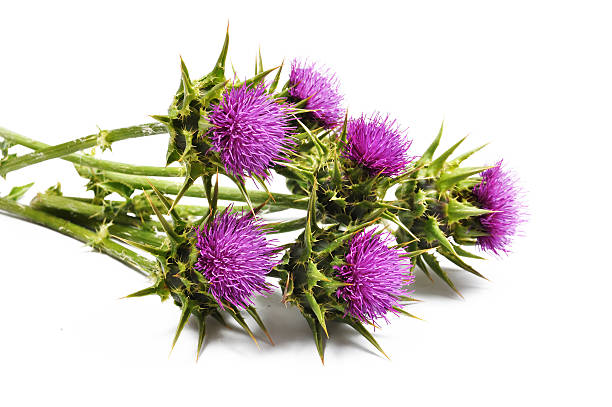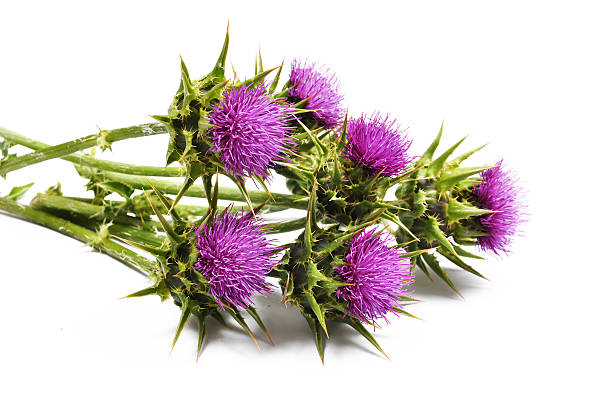
Superfoods for Pets: Milk Thistle
Milk thistle is one of very few traditionally used herbs that has been widely accepted by conventional science to have significant medicinal value. It has been called “milk thistle” because of a feature of the leaves, which are prominently splashed with white spots.
Pets, like humans, are forced to deal with exposure to toxins on a daily basis. There are toxins in the foods we eat, the water we drink, and the air we breathe. We can’t escape them. And, just like humans, a pet’s liver is used to filter these toxins from their blood. Because the liver works so hard at filtering and eliminating all of these toxic substances, it is highly susceptible to serious damage. Detoxification is such an important process not only for us humans but also for our pets. We can be feeding our furry loved ones the best foods in the world but pores clogged with toxins will not allow essential nutrients to pass, causing a weakened immune system. A pet’s weakened immune system equals a multitude of problems!
Liver Damage
There are several causes for liver damage. Viruses, bacteria, drugs, the aforementioned toxins, free radicals, and inflammation are all guilty of wreaking havoc on the liver. Signs of liver damage or disease include a loss of appetite, lethargy, jaundice, dark urine, pale gums or a sudden unexplained weight loss.
Pharmaceutical companies create products with healing and preventative properties when, sometimes, all we have to do is look around and we can find cures for ailments and ways to prevent disease in a more natural form, often right under our feet and in our very own backyards. One of the most astounding things that Mother Nature is capable of doing is producing plants with healing properties.
Consider Milk Thistle
Milk thistle is a flower in the Aster family. A native of the Mediterranean regions of Europe, North Africa, and the Middle East, this plant, particularly its seeds and roots, has been used medicinally for over 2000 years.
Milk thistle is one of very few traditionally used herbs that has been widely accepted by conventional science to have significant medicinal value. It has been called “milk thistle” because of a feature of the leaves, which are prominently splashed with white spots.
Three important chemicals have been isolated from the milk thistle:
silychristine
silydianin
silybin
The mixture of these three substances is called silymarin. Humans usually use milk thistle as a liver tonic. However, silymarin has recently been advocated for use in pets because the benefits that have been examined in humans have also been approved as beneficial for pets. It can be used in dogs, cats, horses, goats, ferrets, and rodents to aid in liver or kidney damage, hepatitis, jaundice, leptospirosis, and parvovirus recovery.
Liver disease is more common in pets than you might expect. Certain breeds of dogs (such as Labrador Retrievers, Dalmatians and Great Danes) are more susceptible to liver disease due to a genetic difficulty excreting copper.
Liver Repair
Fortunately, research suggests that milk thistle extract not only prevents damage to the liver, but also helps repair it.
First, milk thistle is a powerful antioxidant. Antioxidants protect us from chemicals in our bodies called free radicals. Exposure to environmental toxins can increase free radicals in the body, which can do a lot of damage to our cells. This is called oxidation and can eventually lead to cancer, heart disease, and arthritis. Milk thistle protects the liver against harmful oxidation
Secondly, while we don’t necessarily think of medications as “toxins,” many over the counter drugs and prescription medications can hurt the liver if taken in large enough doses or for long periods of time. Researchers have found that milk thistle can actually prevent or reduce medication induced liver damage. If you have been giving your pet medication and are concerned about the aftermath of chemicals residing in the body, milk thistle will help flush those out.
Thirdly, if the liver has been weakened due to a bevy of reasons, it is unable to break down toxins. In order to combat allergens, the body produces histamine. The liver plays a role in this process; it removes the histamine from the body. If the liver is weakened and congested with toxins, the liver struggles and histamine builds up in the body, leading to more allergic reactions.
The Cause Of Allergies
According to Mark. E. Richardson in his article entitled The Truth Cause of Allergies – It’s In The Liver: “The liver has to process toxins and when it can’t do its job it stores them. If it stores them it also produces additional histamines to protect itself. If an allergen is present the brain sends a message; “Send out a few histamines! I think there’s an invader!!” and the liver proceeds it releases too many, and you have the allergic response – hives, asthma, sneezing, etc. Cleanse the liver and maybe […] you’ll become allergy/asthma free.”
Additional Uses
Milk thistle not only helps treat and prevent liver disease. Below is a list of treatment claims linked to the plant:
Kidney disease
If there has been kidney damage to your pet because of an infection milk thistle has been shown to greatly decrease the amount of time it takes your pet to heal.
Pancreatitis
Although rare in cats, pancreatitis is very common in dogs. Milk thistle can be given to your dog and cat to help alleviate the symptoms
Cancer
Milk thistle has been shown to decrease the effects of cancer in a pet’s body. While there haven’t been many studies done, there have been enough that it has shown improvement and helps protect against the potential for cancer in your pet.
Diabetes
Pets suffering from diabetes that are given milk thistle at least once per week have been shown to not have to have nearly the amount of insulin that they would have had to take otherwise.
Clearly, milk thistle has an array of positive effects throughout the body. However, milk thistle should not be used as a preventative, or a “just in case”; rather, it should be used as a means of cleansing the liver after exposure to toxins (i.e. drugs, vaccines, chemicals, etc.) or as a treatment to liver damage. Milk thistle stimulates the growth of new liver cells in order to replace those that are dead or dying, and helps protect against toxins which could cause further damage.
Remember, medicinal herbs shouldn’t be used for extended periods of time. Gregory L. Tilford and Mary L. Wulff explain in their book entitled Herbs for Pets: The Natural Way to Enhance your Pet’s Life: “Despite much of the publicity that has been generated about this ‘wonder herb’, milk thistle should not be used as a daily food supplement. Milk thistle is a medicine that is best reserved for situations in which the liver is already under abnormal stress.”
Most holistic doctors feel that milk thistle should be administered for 3-6 weeks with a 1-3 week break.
Also, pregnant and lactating pets should not be given milk thistle because the research is still inconclusive.
You can find milk thistle in most health food stores or health sections of your local grocery store. It can be found in capsule, tablet and tincture forms.
How Do I Give Milk Thistle To My Dog?
The usual recommended extract of milk thistle contains 70 to 80 percent silymarin. Each extract should be labelled with the silymarin percent. The tincture can be administered at a starting dose of 1/4 tsp. per 20lbs of the animal’s body weight per day. The daily dosage should be taken in 2-4 equally divided doses. With the powder format, administer 2-5mg per 1lb of the animal’s body weight, 2 to 3 times per day. Read labels carefully, discuss dosages and, although there are no known drug interactions, it’s always important to consult with your veterinarian.

Frequently Asked Questions: Milk Thistle for My Pet
Milk thistle appears to be a safe and well-tolerated herb for animals. Side effects are usually mild and often involve the gastrointestinal tract, such as loose stools or mild digestive upsets.
https://vcahospitals.com/know-your-pet/milk-thistle-or-silymarin
Milk thistle (Silybum marianum) is a spiny, purple-colored flowering herb native to the Mediterranean and North Africa, but it is now commonly grown in North America.
https://petcentral.chewy.com/nutrition-pet-diet-tips-milk-thistle-benefits-for-pets/
Milk thistle appears to be a safe and well-tolerated herb for animals. Side effects are usually mild and often involve the gastrointestinal tract, such as loose stools or mild digestive upsets. Milk thistle is not recommended for use in humans during pregnancy, and this same precaution should be observed in animals.

